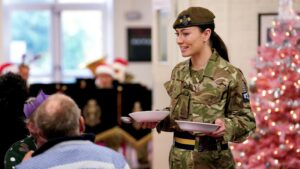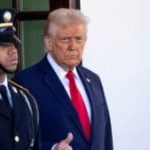
Hundreds of soldiers have been told their Christmas leave is cancelled for the second year in a row after they were drafted in to replace striking Border Force guards.
Troops who served on Covid wards during the Omicron wave last year are being asked to fill in at airports. The Public and Commercial Services Union (PCS) has announced strikes among Border Force staff from December 23 to Boxing Day and from December 28 to New Year’s Eve.
About 100 troops have arrived at Gatwick and Heathrow, where they will remain until after the end of the strikes in the new year. Some are being housed in hotels.
The soldiers are being trained how to check passports and spot instances of modern slavery. In total, 600 personnel have been drafted in to replace striking Border Force staff.
Hundreds of soldiers will also be sent to drive ambulances and provide logistical support in an effort to limit the impact of co-ordinated strikes on the NHS. The Ministry of Defence is on the verge of agreeing to a request from the Department of Health for military support under the military aid to civil authorities protocol, known as Maca.
During the pandemic, soldiers delivered PPE and set up mobile testing units under the same arrangement.
For some of the troops drafted in to help at airports Christmas was one of the last opportunities for them to see their families before they go on six-month foreign deployments next year. Members of the armed forces are not allowed to strike by law.
They have been given a pay rise of 3.75 per cent this year while the Border Force workers are demanding a 10 per cent increase. A private in the army earns £21,424 a year compared with a starting salary of £21,431 for a Border Force officer.
Gillian Keegan, the education secretary, said soldiers standing in for striking workers deserved thanks. “We all owe the military a massive thank you. Not only do they keep us safe and do the most incredible hard job and often away from their families, but they are also the backup,” she told BBC Radio 4. “They have a sense of duty, they don’t have a right to strike either. They don’t strike. Duty to our country is what our military do.”
But Lord Dannatt, the former head of the army, said it was “unreasonable” for the government to ask soldiers about to deploy overseas to cancel their Christmases for striking workers. “Why should a soldier cover for an ambulance driver? The government has got to be careful or it risks seriously hacking off soldiers,” he said.
“If there’s a natural disaster, everybody understands why the military needs to be helping the blue-lights services. But in the context of industrial disputes that many people think the government could resolve but for political purposes chooses not to, the military becomes a substitute for striking labour. That starts to become rather controversial.
“As the armed forces have got smaller, and remain very busy, they have much less spare capacity. It is unreasonable to think soldiers deploying in the new year are free to work before they go away.”
Robert Clark, a former soldier and the defence director of Civitas, a think tank, said: “Once again the army are being used as a convenient political plug, whilst other public sector bodies, who are able to strike, do so trying to gain over four times the pay increase that the army have had.
“Soldiers are out on operations, Christmas is a special time of year for them and their families, and they never complain about the low pay inherent in their job. Compounding issues are the ever-reducing numbers the army has; it can ill afford to lose more good men and women, which covering these strikes will inevitably cause.”
Read more:
Soldiers’ Christmas cancelled to cover striking Border Force guards






